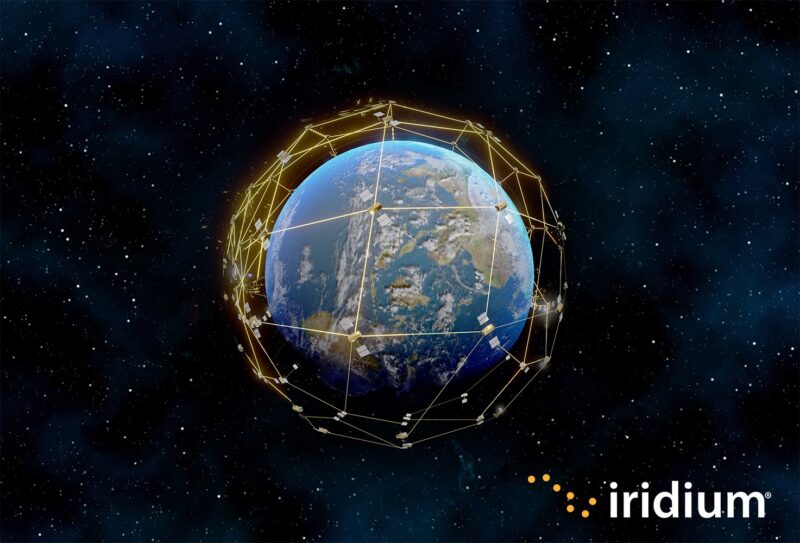Latest News

Rendering of Iridium’s constellation. Photo: Iridium
Iridium Communications is unlikely to see direct-to-device activations this year, expecting the first activations of this new offering with Qualcomm in 2024, CEO Matt Desch said in a call with investors on Tuesday.
In January, Iridium and Qualcomm announced a partnership for new Qualcomm satellite-compatible chips that will enable messaging on Android cell phones via Iridium’s satellite constellation. Smartphone manufacturers Honor, Motorola, Nothing, OPPO, vivo and Xiaomi have publicly signed on to develop smartphones with satellite communication capabilities. Qualcomm previously said the phones would launch in select markets in the second half of this year.
“We’ve completed our qualification work with Qualcomm, but know there’s development and integration work required for the smartphone OEMs that adopt this new satellite technology,” Desch told investors on Tuesday. “We don’t have very good visibility in the timing or volume of specific smartphones, but from what we do know, we now expect the first activations will move into 2024.”
Iridium will receive royalties and network usage fees when the service is operational, but so far, revenue from this partnership falls under the Engineering and Support category. CFO Thomas Fitzpatrick told investors that development fees from Qualcomm are around $5 to $10 million for the full year.
The company’s guidance for this year did not include any material impact from direct-to-device service revenue.
Desch believes the near-term opportunities in direct-to-device are in SOS messaging like Apple’s service with the iPhone 14.
“The evolving market for satellite connectivity to smartphones is potentially very large,” he said. “But to really achieve the big numbers some analysts are talking about could take a long time, probably 10 to 15 years, when you factor in the need for many players to build and launch new satellites and get global regulatory approvals, to achieve the full promise of D2D.”
Financial Results
Iridium reported another quarter of revenue growth, boosting sales 10% in the second quarter from the same time period last year. Total revenue was $398 million in the quarter. Total billable subscribers grew 14% year-over-year, driven by growth in commercial IoT, ending the quarter with 2,140,000 total billable subscribers.
Iridium logged a net loss of about $21 million compared to net income of $7 million in the same quarter last year, due to writing off its remaining ground spare satellite after launching five of its six ground spare satellites in May. The operator said the charge offset strong revenue growth in Commercial and Engineering and Support.
Commercial service revenue in Q2 was $118.6 million, up 12% from last year’s comparable period due to growth in voice and data, IoT data, and broadband. IoT subscribers continue to be a growing part of Iridium’s commercial subscribers and now represent 79% of commercial subscribers, up from 76% a year ago.
Also during the quarter, Iridium passed 10,000 commercial subscribers for its Iridium Certus platform.
Government service revenue remained flat at $26.5 million in the second quarter, reflecting the contractual rate in the Enhanced Mobile Satellite Services (EMSS) contract.
Equipment revenue was $27.4 million in the second quarter, down 19% compared to the prior-year quarter.
Engineering and support revenue was $20.6 million during the second quarter, compared to $8.3 million in the prior-year quarter. Some of this is from the Qualcomm partnership, but most is revenue from Iridium’s work on its Space Development Agency contract for ground operations of Tranche 1 of the Proliferated Warfighter Space Architecture (PWSA).
This quarter follows after last quarter, Iridium grew revenue 22% in Q1 compared to the first quarter of 2022. Iridium reiterated its 2023 outlook, with guidance of service revenue growth between 9% and 11% over 2022.
Desch spoke to Iridium’s stability and niche in the evolving satellite market, seeing Iridium’s role as outside the changes going on in the industry.
“There’s a lot of disruption underway in our industry caused by the new broadband and players and I’m glad that we’re not part of that. We also don’t believe that any of the merger activity in the industry like the recent Viasat/Inmarsat closing impacts our business. It has probably been a net benefit to us ever since the deal was first announced in 2021. Iridium is unlike any other satellite company in the industry today. That’s because we’ve largely avoided the allure of delivering commodity services and speeds — to instead focus on the niche services that we do better than any other company in the industry.”
Get the latest Via Satellite news!
Subscribe Now